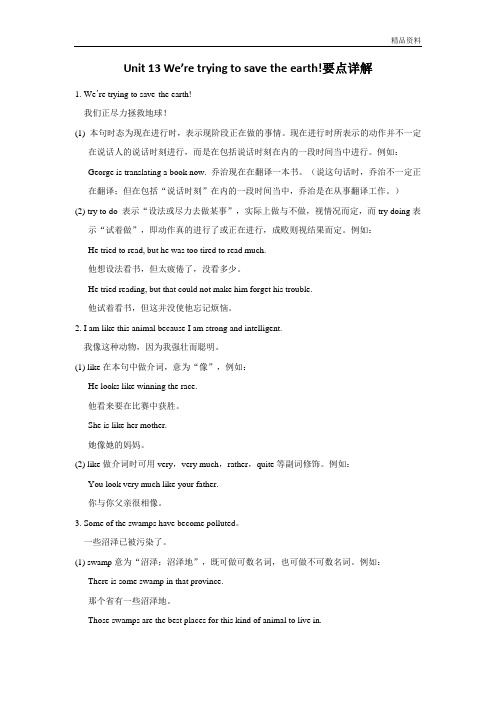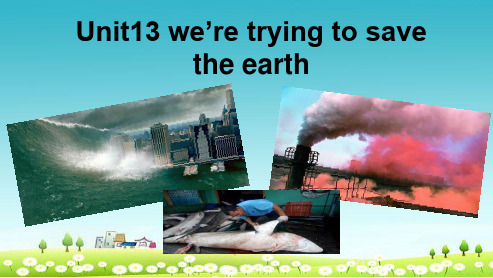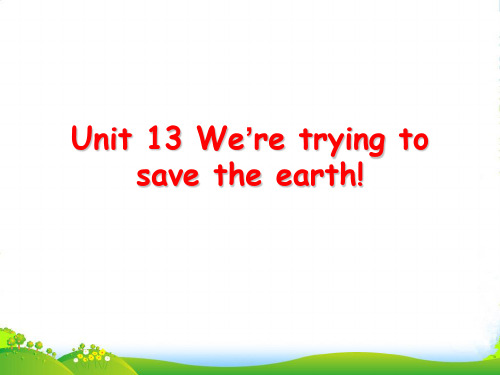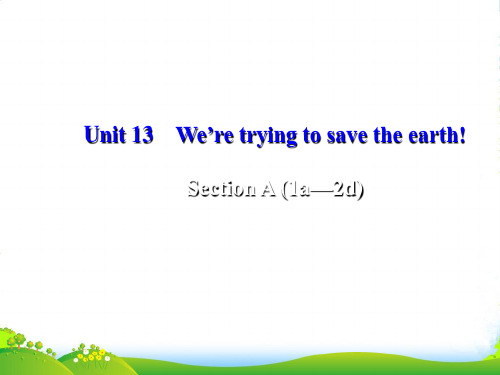【最新】人教版九年级英语下册unit 13 we’re trying to save the earth! Section A习题
- 格式:doc
- 大小:105.00 KB
- 文档页数:2

Unit 13 We’re trying to save the earth!要点详解1. We’re trying to save the earth!我们正尽力拯救地球!(1) 本句时态为现在进行时,表示现阶段正在做的事情。
现在进行时所表示的动作并不一定在说话人的说话时刻进行,而是在包括说话时刻在内的一段时间当中进行。
例如:George is translating a book now. 乔治现在在翻译一本书。
(说这句话时,乔治不一定正在翻译;但在包括“说话时刻”在内的一段时间当中,乔治是在从事翻译工作。
)(2) try to do 表示“设法或尽力去做某事”,实际上做与不做,视情况而定,而try doing表示“试着做”,即动作真的进行了或正在进行,成败则视结果而定。
例如:He tried to read, but he was too tired to read much.他想设法看书,但太疲倦了,没看多少。
He tried reading, but that could not make him forget his trouble.他试着看书,但这并没使他忘记烦恼。
2. I am like this animal because I am strong and intelligent.我像这种动物,因为我强壮而聪明。
(1) like在本句中做介词,意为“像”,例如:He looks like winning the race.他看来要在比赛中获胜。
She is like her mother.她像她的妈妈。
(2) like做介词时可用very,very much,rather,quite等副词修饰。
例如:You look very much like your father.你与你父亲很相像。
3. Some of the swamps have become polluted。
一些沼泽已被污染了。





unit 13 we’re trying to save the earth! Section A习题课题Unit13Section A Exercise课型展示课执笔人审核人级部审核讲学时间第周第导学稿教师寄语Pain past is pleasure.(无论多么艰难一定要咬牙冲过去,将来回忆起来,一定甜蜜无比)学习目标1.知识目标:能掌握Unit13 SectionA中的重点单词及短语。
2.能力目标:Can talk about pollution and environmental protection.3 情感目标:了解西方节日及风俗习惯,尊重文化差异。
学生自主活动材料I. 写出下面单词的意思。
1. littler ______2. bottom ________3. fisherman _____ 3. coal __________5. ugly ________6advantage ______7. cost ________ 8. wooden ________9. plastic _______ 1. take part in __________ 2. turn off ____________3. pay for ____________4. hear of _____________5. be harmful to ___________II. 1.. Please stop the children from _____ (play) football in the street.2. Italy is one of the old _____ (city) in Europe.3. There will be much _____ (little) than today in the future.4. Don’t _____ (climb) the trees. It’s dangerous, Jim.5. Yesterday I _____ (break) my bike when I went cycling.6. I am scared of _____ (go) out alone at night.7. What about ______ (go) swimming.8.. They are all ______ (interest) in playing basketball.9.. We can take the taxi instead of ______ (drive).10. Look in the mirror and smile at _____. (you)III.单项选择1. —Are you going to _____ any of the events?—Yes. Maybe long jump and high jump.A. take part inB. joinC. attendD. join in2. I can’t afford ____ him an expensive birthday present.A. to buyB. buyingC. for buyingD. buy3. —Remember to ____ the lights when you leave the room.—OK. I will.A. turn onB. turn downC. turn upD. turn off4. The girl always has some money to ___ snacks.A. spendB. pay forC. takeD. cost5. —Look! _____ boys are playing on the playground.—Yes. _____ them is about 200.A. The number of; A number ofB. The number of; The number of6. —Have you _____ a club?—Yes, I’m in a swimming club and I often _____ the swimming training.A. joined; take part inB. joined; joinC. taken part in; joinD. taken part in; join in7. —We’re going for a picnic. Would you like to____ us?—Why not? Let’s go!A. attendB. joinC. join inD. take part in8. He ____ go out with his parents, but now he ____ staying at home alone.A. used to; is used toB. is used to; used toC. use to; is used toD. is used to; is used to9. The interesting book _____ me 10 yuan.A. spentB. tookC. paidD. cost10. We must do something useful to ____ pollution.A. cut offB. cut upC. cut downD. cut in11. Smoking can _____ lung cancer. You’d better give it up.A. work onB. lead toC. take awayD. put out12. —What are the _____ of bike riding?—It can help cut down air pollution.A. advantagesB. reasonsC. resultsD. ideas13. —Do you take exercise every day?—Yes. I always ___thirty minutes after supper.A. spendB. costC. takeD. pay14. I _________ $300 for the bike.A. tookB. spentC. costD. paid15.—Did you tell it to Jack?—Yes, but we were ____ in the middle of our telephone conversation.A. cut downB. cut offC. cut upD. cut into1.Once a boy came to ask a fisherman how ___________(become) cleverer because his mother always called him “foolish boy”. “That is easy, ” answered the fisherman. “I know one way to make you ______(be ) a clever boy." Really?”“Of course. A fish head is good for brains. If you eat one a day, you ______ (become) much cleverer. _________(pay) only three pounds for one fish head.” The boy paid him three pounds and the fisherman _________(cut) off a fish head and gave it to him.A raw(生的)fish head is no good--- not even for a hungry boy _____(eat)----but the boy ate it up in two gulps.“Do you feel anything?” asked the fisherman after the boy ate the fish head.“Not in my head,” said the boy.The boy sat on the ground and _________(think), “One whole fish _________(cost) only two pounds, but I _________(pay) him three pounds for the fish already. Why couldn’t I have the whole fish for soup, a head for brain and one pound left over?” He jumped up and shouted at the fisherman, “The fish head _________(work) now, you see?”2.One day a lady saw a mouse ___________(run) across her kitchen floor when she ___________(cook). She was very afraid of mice, so she ran out of the house, got on a bus and __________(go)down to the shops. There she spent 10 dollars _________(buy) a mouse-trap. The shopkeeper said to her, “Put some cheese on it, then you __________(catch) that mouse soon.”The lady went home with the mouse-trap, but when she looked in her cupboard, any cheese couldn’t ________ (find) in it. She didn’t want ______(go) back to the shop because it was too late, so she cut a picture of some cheese out of a magazine and _______(put) that in the trap.To her surprise, the picture of the cheese _________(be) quite successful! When the lady came down the kitchen the next morning, she found there was a picture of a mouse which _________(put) in the trap beside the picture of the cheese!自我评价专栏(分优良中差四个等级)自主学习:合作与交流:书写:综合:。